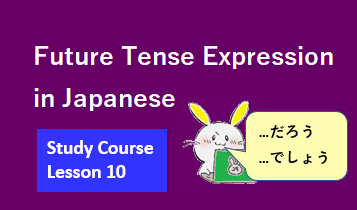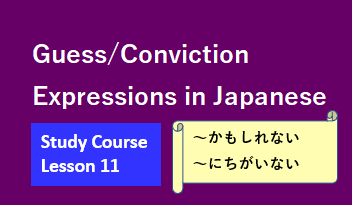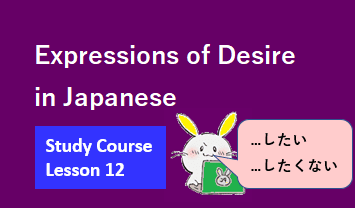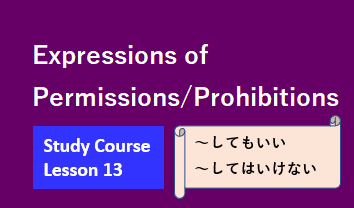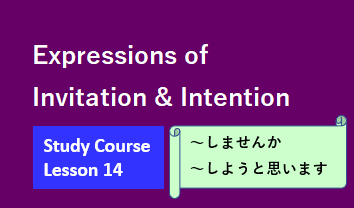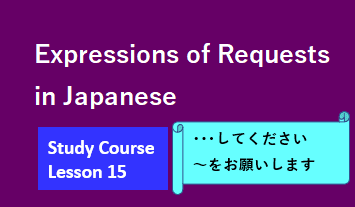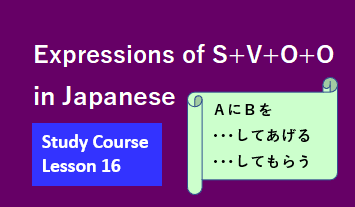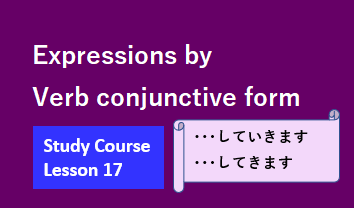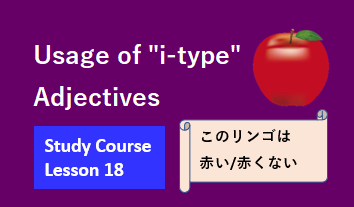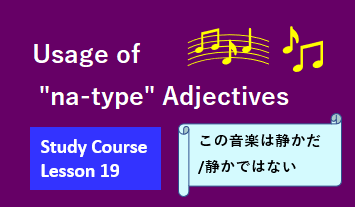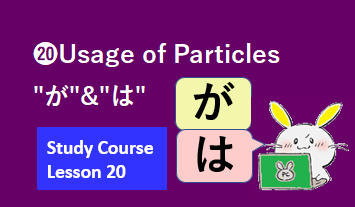Japanese Study Course Lesson7

Hello everyone. I'm JJ. Nice to meet you! Welcome to Japanese Study Course. In lesson 7, we will study verb situational expressions in Japanese. The verb expression that indicates the situation has the same form as the present progressive tense, but the content of the expression is different.
7-1 Situational Expressions
Situational Expressions ➡ " Verb( conjunctive form )+て+いる/います "
(1) 知らない人が玄関の前に立っています
- A stranger is standing in front of the door.
- Ordinary:知らない人が玄関の前に立っている。
- Politely:知らない人が玄関の前に立っています。
- Replacing "いる" with "います" makes it more polite.
- The verb expression that indicates the situation has the same form as the present progressive tense. However, that is not progressive action but shows situation.
- This expression does not indicate the action of the stranger in the present progressive tense, but conveys the situation that "an unknown person is standing in front of the entrance."
◆Detailed explanation
- Ordinary:知らない人が玄関の前に立っている。
- Politely:知らない人が玄関の前に立っています。
- 知らない(noun modifier)+人(subject)+が(nominative particle)
- +玄関の前に(adverb phrase, place)
- +立っ(verb "立つ", conjunctive form)+て(conjunction particle)
- +いる(auxiliary verb, situation)/ +います(auxiliary verb, polite situation)。
- ※「知らない(noun modifier)」➡知ら(verb, negative form)+ない(auxiliary verb, negation)
- ※「玄関の前に(adverb phrase, place)」➡玄関(noun)+の(case particle)+前(noun, position)+に(objective particle, position)
◆Vocabulary note
| 知らない人:知らない(noun modifier)+人(noun) stranger 玄関 :(noun) door, entrance 前 :(noun) front, former に :(objective particle, position) Particle of place 立つ :(verb) stand |
◆Advanced Study Conjugation of the verb "知る"(Five-step)
| Negative form 知ら(ない) Auxiliary verb "ない" is added after | 知らない人が玄関の前に立っています。 A stranger is standing in front of the door. |
| Consecutive form 知り(ます/ました/ません) Auxiliary verb "ます/ました/ません" is added after | 私は北海道がとても寒いことを初めて知りました。 I learned for the first time that Hokkaido is very cold. |
| Past tense form 知っ(た) Auxiliary verb "た" is added after | 私は北海道がとても寒いことを初めて知った。 I learned for the first time that Hokkaido is very cold. |
| Conjunctive form 知っ(て) Conjunction particle "て" is added after | 私は玄関の前に立っている人を知っています。 I know someone standing in front of the door. |
| Basic form 知る | 知る know |
| Adnominal form 知る(+noun) Noun is added after | 彼はこの事実を知るときにショックを受けるだろう。 He will be shocked when he learns this fact. |
| Hypothesis form 知れ(ば) Conjunction particle "ば" is added after | 彼はこの事実を知ればショックを受けるだろう。 He will be shocked to know this fact. |
| Imperative form Nothing of conjugation State verbs do not have an imperative form | |
| Intentional form 知ろ(う) Auxiliary verb "う" is added after | 彼は日本のことを詳しく知ろうと思い、そのため毎日勉強している。 He wants to know more about Japan, so he is studying every day. |
The conjugation form of the verb "知る" takes the form of "ra, ri, ru, re, ro" like "知らない, 知りたい, 知る, 知れば, 知ろう", so it is called the five-step conjugation of verbs.
◆Advanced Study Conjugation of the verb "立つ"(Five-step)
| Negative form 立た(ない) Auxiliary verb "ない" is added after | 風が強くてポールがうまく立たない。 The wind is so strong that the poles don't stand up well. |
| Consecutive form 立ち(ます/ました/ません) Auxiliary verb "ます/ました/ません" is added after | 私は彼らに悪口を言われて、腹が立ちました。 I got angry when they called me bad. |
| Past tense form 立っ(た) Auxiliary verb "た" is added after | 私は彼らに悪口を言われて、腹が立った。 I got angry when they called me bad. |
| Conjunctive form 立っ(て) Conjunction particle "て" is added after | 知らない人が玄関の前に立っています。 A stranger is standing in front of the door. |
| Basic form 立つ | 立つ stand |
| Adnominal form 立つ(+noun) Noun is added after | 腹が立つときには深呼吸をしてみよう。 Take a deep breath when you get angry. |
| Hypothesis form 立て(ば) Conjunction particle "ば" is added after | このポールが立てば完成です。 If this pole stands up, it is completed. |
| Imperative form 立て The form for giving orders | 号令に合わせて立て! Stand according to the order! |
| Intentional form 立と(う) Auxiliary verb "う" is added after | 彼は日本の未来のために選挙に立とうと決意しました。 He decided to stand in the election for Japan's future. |
The conjugation form of the verb "立つ" takes the form of "ta, chi, tsu, te, to" like "立たない, 立ちたい, 立つ, 立てば, 立とう", so it is called the five-step conjugation of verbs.
(2) 彼女は有名な大学を卒業しています
- She graduated from a famous university.
- Ordinary:彼女は有名な大学を卒業している。
- Politely:彼女は有名な大学を卒業しています。
- Replacing "いる" with "います" makes it more polite.
- This expression is not used in the past tense to say that she graduated from a famous university, but is used when describing the situation based on the record that she graduated from a famous university.
◆Detailed explanation
- Ordinary:彼女は有名な大学を卒業している。
- Politely:彼女は有名な大学を卒業しています。
- 彼女(subject)+は(nominative particle)
- +有名な大学(object)+を(objective particle)
- +卒業し(verb "卒業する", conjunctive form)+て(conjunction particle)
- +いる(auxiliary verb, situation)/ +います(auxiliary verb, polite situation)。
- ※「有名な大学(object)」➡有名な(adjective)+大学(noun)
◆Vocabulary note
| 有名な :(adjective) famous 大学 :(noun) university 卒業する:(verb) graduate |
◆Advanced Study Conjugation of the verb "卒業する"('sa-line' specific)
| Negative form 卒業し(ない) Auxiliary verb "ない" is added after 卒業せ(ず) Auxiliary verb "ず" is added after | 彼は大学を卒業せずに、自分の会社を開始した。 He started his own company without graduating from college. |
| Consecutive form 卒業し(ます/ました/ません) Auxiliary verb "ます/ました/ません" is added after | 私は来年高校を卒業します。 I will graduate from high school next year. |
| Past tense form 卒業し(た) Auxiliary verb "た" is added after | 私の弟は昨年中学を卒業した。 My younger brother graduated from junior high school last year. |
| Conjunctive form 卒業し(て) Conjunction particle "て" is added after | 彼女は有名な大学を卒業しています。 She graduated from a famous university. |
| Basic form 卒業する | 卒業する graduate |
| Adnominal form 卒業する(+noun) Noun is added after | 彼が大学を卒業するときにお祝いしましょう。 Congratulate him when he graduates from college. |
| Hypothesis form 卒業すれ(ば) Conjunction particle "ば" is added after | 誰でも学校を卒業すれば立派な社会人です。 Anyone who graduates from school is a good member of society. |
| Imperative form 卒業しろ The form for giving orders | 留年せずに卒業しろよ! Graduate without repeating the year! |
| Intentional form 卒業しよ(う) Auxiliary verb "う" is added after | 彼は頑張って大学を卒業しようとする意志がない。 He has no will to work hard and graduate from college. |
The conjugation form of the verb "卒業する" takes the irregular form of "shi(se), shi, suru, sure, shiro(shiyo)" like "卒業しない(卒業せず), 卒業します, 卒業する, 卒業すれば, 卒業しろ(卒業しよう)", so it is called the 'sa-line' specific conjugation of verbs.
(3) 私は今彼女の家に遊びに来ています
- I'm visiting her house now.
- Ordinary:私は今彼女の家に遊びに来ている。
- Politely:私は今彼女の家に遊びに来ています。
- Replacing "いる" with "います" makes it more polite.
- The verb"来る" originally expresses the action of coming from a certain place, but the expression "来ている/来ています" here expresses the situation as "I am visiting."
◆Detailed explanation
- Ordinary:私は今彼女の家に遊びに来ている。
- Politely:私は今彼女の家に遊びに来ています。
- 私(subject)+は(nominative particle)
- +今(time)
- +彼女の家(object)+に(objective particle, place)
- +遊びに(verb modifier)
- +来(verb "来る", conjunctive form)+て(conjunction particle)
- +いる(auxiliary verb, situation)/ +います(auxiliary verb, polite situation)。
- ※「遊びに(verb modifier)」➡遊び(noun)+に(objective particle, verb modifier)
- ※「遊びに来る」:遊びに(verb modifier)+来る(verb) come to play
- ※「遊びに行く」:遊びに(verb modifier)+行く(verb) go to play
◆Vocabulary note
| 家 :(noun) house, home 遊び:(noun) to play 来る:(verb) come |
A new usage of the particle "に" has appeared. Like "遊びに", it is added after a noun to form a verb modifier.

◆Advanced Study Conjugation of the verb "来る"('ka-line' specific)
| Negative form 来(ない) Auxiliary verb "ない" is added after 来(ず) Auxiliary verb "ず" is added after | 彼は今日図書館には来ない。 He won't come to the library today. |
| Consecutive form 来(ます/ました/ません) Auxiliary verb "ます/ました/ません" is added after | 彼は今日図書館に来ますか。 Will he come to the library today? |
| Past tense form 来(た) Auxiliary verb "た" is added after | 彼は昨日図書館に来た。 He came to the library yesterday. |
| Conjunctive form 来(て) Conjunction particle "て" is added after | 私は今彼女の家に遊びに来ています。 I'm visiting her house now. |
| Basic form 来る | 来る come |
| Adnominal form 来る(+noun) Noun is added after | 彼が図書館に来るときはいつですか。 When will he come to the library? 彼が図書館に来る前に必要な本を探しましょう。 Before he comes to the library, let's find the necessary books. |
| Hypothesis form 来れ(ば) Conjunction particle "ば" is added after | 彼も今日図書館に来れば、一緒に勉強できたのに。 If he had come to the library today, we could have studied together. |
| Imperative form 来い The form for giving orders | 早く来い! Come quickly! |
| Intentional form 来よ(う) Auxiliary verb "う" is added after | このホテルは快適なので、また来ようと思う。 This hotel is comfortable, so I think I will come again. |
The conjugation form of the verb "来る" takes the irregular form of "ko, ki, kuru, kure, koi(koyo)" like "来ない(来ず), 来ます, 来る, 来れば, 来い(来よう)", so it is called the 'ka-line' specific conjugation of verbs. This specific verb conjugation applies only to verb"来る".
Regarding the adnominal form, we have explained that nouns such as "とき/ところ" is added after, from this lesson, we will use the more general form of "verb + noun" like "来る(+noun)".
7-2 Situational Expression & Present Progressive Tense
- In Japanese, situational expressions and the present progressive tense are similar in expression, so be careful.
- For situational expressions, the verbs used are the verbs that describe the situation (e.g. standing, graduating, coming to play). It represents a situation rather than an action.
- For the present continuous tense, the verbs used are action verbs (watching TV, studying). It shows how the action is progressing.
Let's finish the homework I didn't do yesterday before Miss JJ comes to class! Oh! I have to say "before Miss JJ comes to class" in Japanese, "JJ先生が教室に来る前に". It's "来る(verb, adnominal form)+前(noun)".


Rabbit, you've studied well!
Today's lesson ends here. Ladies and gentlemen, did you understand today's theme "Verb Situational Expressions"? Next time, we will learn possible expressions like "I can do something" in detail. See you!
See you next time!

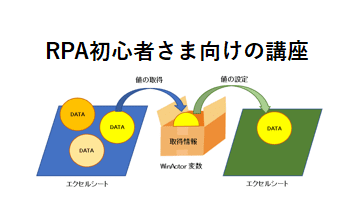

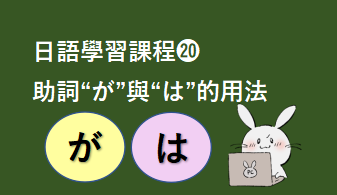






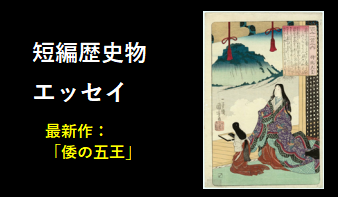
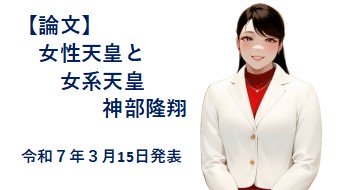



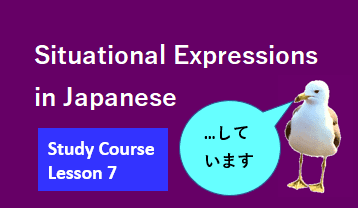


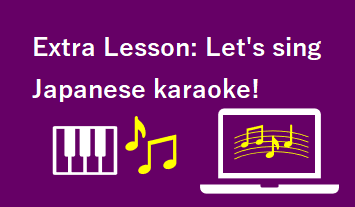

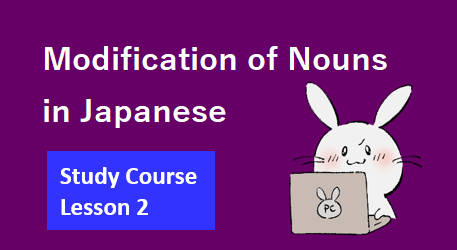



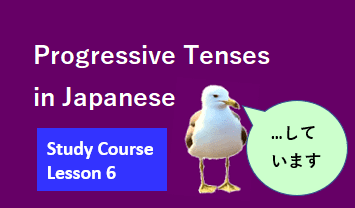
![❽Possible Expressions [1]](https://ryusho-kanbe.com/wp-content/uploads/2023/04/スクリーンショット-2023-04-03-100754.png)
![❾Possible Expressions [2]](https://ryusho-kanbe.com/wp-content/uploads/2023/04/スクリーンショット-2023-04-28-095816.png)
